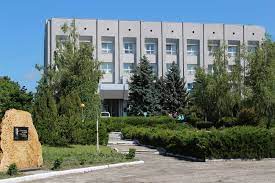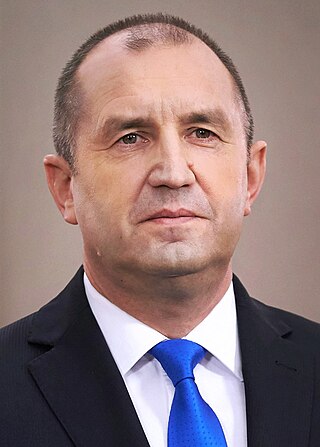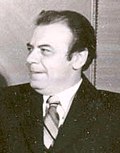
The politics of Bulgaria take place in a framework of a parliamentary representative democratic republic, whereby the prime minister is the head of government, and of a multi-party system. Executive power is exercised by the government. Legislative power is vested in both the government and the National Assembly. The Judiciary is independent of the executive and the legislature.

The President of the Republic of Bulgaria is the head of state of Bulgaria and the commander-in-chief of the Bulgarian Army. The official residence of the president is at Boyana Residence, Sofia. After the completion of the second round of voting, candidate Rumen Radev was elected President of Bulgaria on 13 November 2016.

Georgi Sedefchov Parvanov is a Bulgarian historian and politician who was President of Bulgaria from 2002 to 2012. He was elected after defeating incumbent Petar Stoyanov in the second round of the November 2001 presidential election. He took office on 22 January 2002. He was reelected in a landslide victory in 2006, becoming the first Bulgarian president to serve two terms. Parvanov supported Bulgaria's entry into NATO and the European Union.

The Bulgarian Socialist Party, also known as The Centenarian, is a centre-left, social democratic political party in Bulgaria. The BSP is a member of the Socialist International, Party of European Socialists, and Progressive Alliance. Although founded in 1990 in its modern form, it traces its political heritage back to the founding of the BRDSP in 1891. It is also Bulgaria's largest party by membership numbers.

Petar Stefanov Stoyanov is a Bulgarian politician who served as President of Bulgaria from 1997 to 2002. A member of the Union of Democratic Forces (UDF), he was the party's nominee to succeed one-term president Zhelyu Zhelev in 1996. He was elected to the Presidency in 1996, but lost his reelection bid in 2001. Following a brief retirement from politics, he became an MP in 2005 and later Chairman of UDF from 1 October 2005 to 22 May 2007. He resigned following the 2007 European Parliament election.
The official public holidays in Bulgaria are listed in the table below.

Bulgaria elects on the national level a head of state—the president—and a legislature. The president is elected for a five-year term directly by the people. The National Assembly has 240 members elected for a four-year term by proportional representation in multi-seat constituencies with a 4% threshold. Bulgaria has a multi-party system in which often no one party has a chance of gaining power alone and parties must work with each to form governments.
The history of Bulgaria from 1990 to the present is the period of Bulgarian history that begins after the fall of Communism and the transition to a market economy.

The chairperson of the National Assembly of the Republic of Bulgaria is the presiding officer of the National Assembly of Bulgaria. The assembly selects the chairperson during its opening session. The term of the chairperson coincides with the term of the assembly. The salary of the chairperson is 5,900 lev per month.

Tsetska Tsacheva Dangovska is a Bulgarian politician from GERB and a jurist. She was the Minister of Justice of the Republic of Bulgaria from 4 May 2017 to 5 April 2019. She had previously held the position of Chairwoman of the National Assembly of Bulgaria on two occasions. Tsetska Tsacheva is the first woman to ever chair the National Assembly of Bulgaria since its establishment in 1878.

Rosen Asenov Plevneliev is a Bulgarian politician who was the 4th President of Bulgaria, holding the position from January 2012 to January 2017. He was the Minister of Regional Development and Public Works from July 2009 to September 2011 as part of the cabinet of Boyko Borisov. In October 2011, Plevneliev was elected as President in a second round of voting; he was inaugurated on 18 January 2012.
The Chairman (President) of the Republic of the People's Republic of Bulgaria was the head of state of Bulgaria from 3 April 1990 to 22 January 1992. The office was known as the Chairman (President) of the People's Republic of Bulgaria until the word "People's" was dropped from the country's name on 15 November 1990. From that point on, the office was simply the Chairman (President) of the Republic of Bulgaria.

Constitutional Assembly elections were held in Bulgaria in June 1881. The body known as the Grand National Assembly was convened for a second time in Svishtov in order to consider the amendments to the constitution proposed by prince Alexander I of Battenberg. The proposed amendments were an echo from the Conservative's requests during the first constitutional assembly elections back in 1879. The amendments proposed included restricting civil liberties, reducing the size of the National Assembly, making the franchise indirect and introducing a state council. These amendments would, in effect, suspend the constitution and turn Bulgaria into an authoritarian dictatorship.

Parliamentary elections were held in Bulgaria in the autumn of 1882. These were the first elections since the suspension of the constitution by the Second Grand National Assembly on 13 July 1881. As part of the amendments adopted by the GNA, the number of representatives was brought down from 307 to 47, the lowest in Bulgarian history. The Liberal Party boycotted the poll in protest over last year's election campaign. This resulted in another conservative majority. The assembly convened on 10 December 1882. Unlike last time, the conservatives showed a surprising degree of independence, that was shown primarily against the Russians. Disagreements over foreign and domestic policies led prince Alexander I and the Assembly to stand against Russian influence and restore the constitution on 6 September 1883. This prompted the departure of Russian generals Leonid Sobolev and Alexander Kaulbars and then the forming of a coalition government between Liberals and Conservatives chaired by Dragan Tsankov.

Constitutional Assembly elections were held in Bulgaria in 1886. The body known as the Grand National Assembly was convened for a third time in order to elect a new prince following the abdication of Alexander I. The assembly was composed of 493 representatives and convened on 19 October 1886. It then dissolved itself on 3 August 1887, having elected Ferdinand Saxe-Coburg and Gotha as the new prince of Bulgaria.

The Gregory Tsamblak State University was a public university located in Taraclia, Moldova. It was dissolved in 2023.

Presidential elections were held in Bulgaria on 6 November 2016, alongside a referendum on changes to the electoral system and political party funding. The second round was held on 13 November 2016, resulting in the victory of Rumen Radev.

Rumen Georgiev Radev is a Bulgarian politician and former major general who has been the president of Bulgaria since 22 January 2017.





















